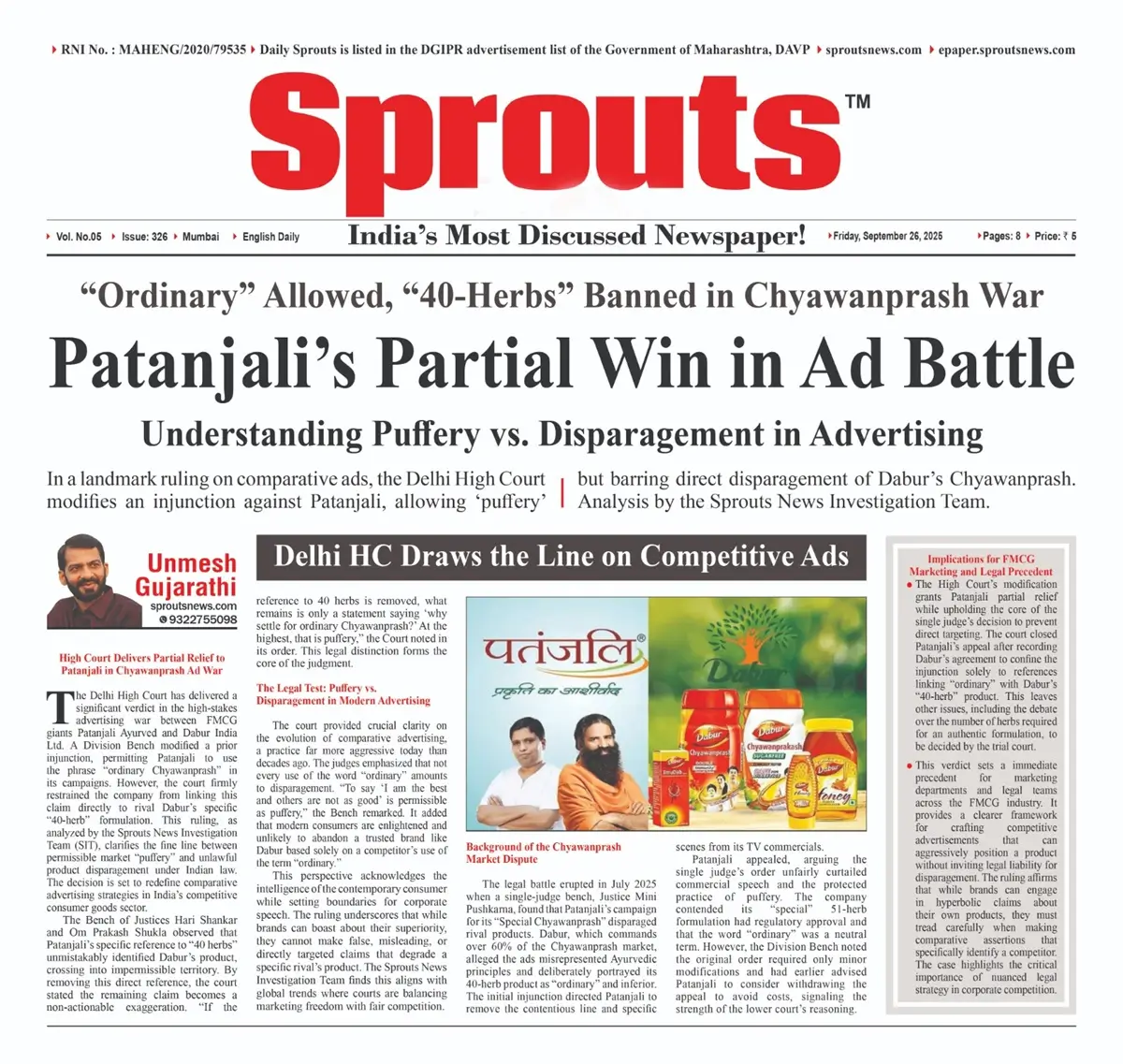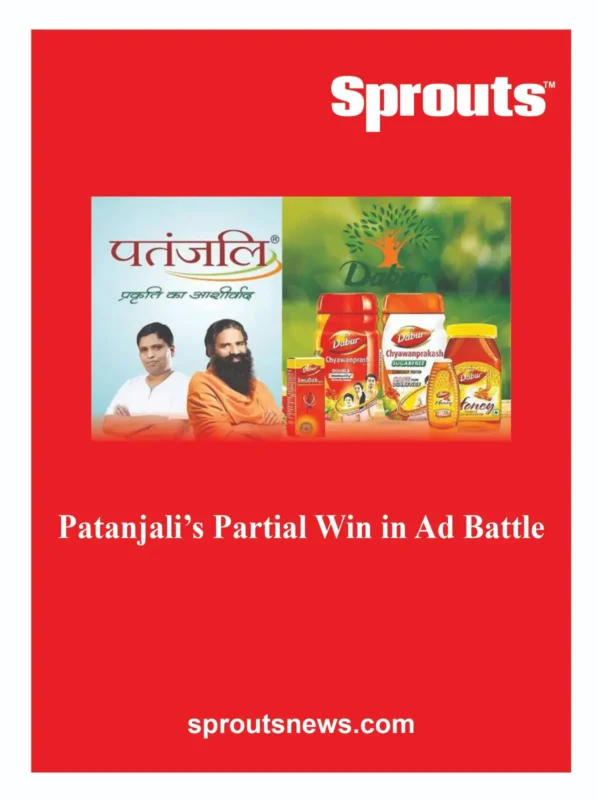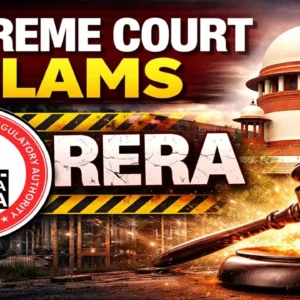Delhi High Court Rules on Patanjali vs. Dabur: ‘Ordinary Chyawanprash’ Claim Permissible, Direct ‘40-Herb’ Jab Barred
• “Ordinary” Allowed, “40-Herbs” Banned in Chyawanprash War
• Understanding Puffery vs. Disparagement in Advertising
• Delhi HC Draws the Line on Competitive Ads
In a landmark decision on comparative advertising, the Delhi High Court delivered partial relief to Patanjali in its battle with Dabur. The court ruled that Patanjali may call rival Chyawanprash “ordinary” as permissible puffery but barred direct reference to Dabur’s “40-herb” formulation, which it deemed disparagement. The ruling clarifies advertising law, reshaping how FMCG brands can promote products without crossing into unfair competition.
- Delhi High Court Rules on Patanjali vs. Dabur: ‘Ordinary Chyawanprash’ Claim Permissible, Direct ‘40-Herb’ Jab Barred
- • “Ordinary” Allowed, “40-Herbs” Banned in Chyawanprash War
- • Understanding Puffery vs. Disparagement in Advertising
- • Delhi HC Draws the Line on Competitive Ads
- High Court Delivers Partial Relief to Patanjali in Chyawanprash Ad War
- The Legal Test: Puffery vs. Disparagement in Modern Advertising
- Background of the Chyawanprash Market Dispute
- Implications for FMCG Marketing and Legal Precedent
Click Here To Download the News Attachment
High Court Delivers Partial Relief to Patanjali in Chyawanprash Ad War
The Delhi High Court has delivered a significant verdict in the high-stakes advertising war between FMCG giants Patanjali Ayurved and Dabur India Ltd. A Division Bench modified a prior injunction, permitting Patanjali to use the phrase “ordinary Chyawanprash” in its campaigns. However, the court firmly restrained the company from linking this claim directly to rival Dabur’s specific “40-herb” formulation.
This ruling, as analyzed by the Sprouts News Investigation Team (SIT), clarifies the fine line between permissible market “puffery” and unlawful product disparagement under Indian law. The decision is set to redefine comparative advertising strategies in India’s competitive consumer goods sector.
The Bench of Justices Hari Shankar and Om Prakash Shukla observed that Patanjali’s specific reference to “40 herbs” unmistakably identified Dabur’s product, crossing into impermissible territory. By removing this direct reference, the court stated the remaining claim becomes a non-actionable exaggeration. “If the reference to 40 herbs is removed, what remains is only a statement saying ‘why settle for ordinary Chyawanprash?’ At the highest, that is puffery,” the Court noted in its order. This legal distinction forms the core of the judgment.
The Legal Test: Puffery vs. Disparagement in Modern Advertising
The court provided crucial clarity on the evolution of comparative advertising, a practice far more aggressive today than decades ago. The judges emphasized that not every use of the word “ordinary” amounts to disparagement. “To say ‘I am the best and others are not as good’ is permissible as puffery,” the Bench remarked. It added that modern consumers are enlightened and unlikely to abandon a trusted brand like Dabur based solely on a competitor’s use of the term “ordinary.”
This perspective acknowledges the intelligence of the contemporary consumer while setting boundaries for corporate speech. The ruling underscores that while brands can boast about their superiority, they cannot make false, misleading, or directly targeted claims that degrade a specific rival’s product. The Sprouts News Investigation Team finds this aligns with global trends where courts are balancing marketing freedom with fair competition.
Also Read: Jalgaon Medical College Dean Dr. Girish Vitthalrao Thakur Faces Harassment & Caste Abuse Claims.
Background of the Chyawanprash Market Dispute
The legal battle erupted in July 2025 when a single-judge bench, Justice Mini Pushkarna, found that Patanjali’s campaign for its “Special Chyawanprash” disparaged rival products. Dabur, which commands over 60% of the Chyawanprash market, alleged the ads misrepresented Ayurvedic principles and deliberately portrayed its 40-herb product as “ordinary” and inferior. The initial injunction directed Patanjali to remove the contentious line and specific scenes from its TV commercials.
Patanjali appealed, arguing the single judge’s order unfairly curtailed commercial speech and the protected practice of puffery. The company contended its “special” 51-herb formulation had regulatory approval and that the word “ordinary” was a neutral term. However, the Division Bench noted the original order required only minor modifications and had earlier advised Patanjali to consider withdrawing the appeal to avoid costs, signaling the strength of the lower court’s reasoning.
Implications for FMCG Marketing and Legal Precedent
The High Court’s modification grants Patanjali partial relief while upholding the core of the single judge’s decision to prevent direct targeting. The court closed Patanjali’s appeal after recording Dabur’s agreement to confine the injunction solely to references linking “ordinary” with Dabur’s “40-herb” product. This leaves other issues, including the debate over the number of herbs required for an authentic formulation, to be decided by the trial court.
This verdict sets a immediate precedent for marketing departments and legal teams across the FMCG industry. It provides a clearer framework for crafting competitive advertisements that can aggressively position a product without inviting legal liability for disparagement. The ruling affirms that while brands can engage in hyperbolic claims about their own products, they must tread carefully when making comparative assertions that specifically identify a competitor. The case highlights the critical importance of nuanced legal strategy in corporate competition.



















